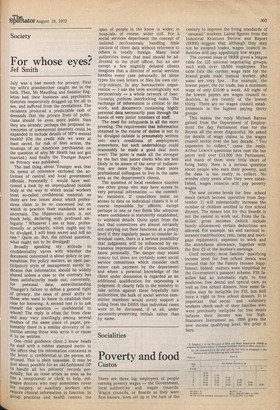S oc i et y
For whose eyes?
Jef Smith
July was a bad month for privacy. First my wife's grandmother caught me in the bath. Then, Mr Maudling and Senator Eagleton had their business and psychiatric histories respectively dragged up for all to see, and suffered from the revelations. The incidents produced a predictable rash of demands that the private lives of politicians should be even more public than they are already; perhaps the proposed inventories of commercial interests could be expanded to include details of MP's mental health? (On the credit side we were at least saved, for risk of libel action, the musings of an American psychiatrist on the question of why Mr Heath has not got married.) And finally the Younger Report on Privacy was published.
The bad thing about Younger was that its terms of reference excluded the activities of central and local government officials. Personally I would have welcomed a look by an unprejudiced outside body at the way in which social workers treat so-called confidential material, as there are few issues about which professions claim to be so concerned but on which in practice their standards are so uncertain. The Hippocratic oath is not much help, declaring with profound ambiguity "Whatever I see or hear, professionally or privately, which ought not to be divulged, I will keep secret and tell no one." Quite so. But, the critical question, what ought not to be divulged?
Broadly speaking my attitude to confidentiality varies with whether the document concerned is about policy or personalities. For policy matters, an open participatory style of management surely indicates that information should be widely shared unless a case to the contrary has been satisfactorily made out; conversely, for personal data, notwithstanding Younger's failure to define a general right of privacy, the onus of proof shifts to those who want to know to establish their case for knowing. A second test is to ask oneself the question --confidential to Whom? The reply is often far from clear and may vary startlingly among several readers of the same piece of paper; presumably there is a similar diversity of intention among those who write it or cause It to be written.
One child guidance clinic I know heads its mail with a rubber stamped motto to the effect that the information contained in the letter is confidential to the person addressed. This is plain nonsense. It may be just about possible for an old-fashioned GP to handle all his patients' records personally, but an issue arises as soon as he has a receptionist or clerk to help, colleague doctors who may sometimes cover his surgery, or auxiliary workers who require clinical information to function, In group practices and health centres the span of people in the know is wider; in hospitals, of course, wider still. For a social services department the concept of isolated professionals handling little pockets of client data without reference to others is totally foreign. Many local authorities insist that mail should be addressed to the chief officer, but no one except a few mightily deluded clients imagines that a director of social services handles every case personally, let alone types his own letters or files his own correEp:.ndence. In any bureaucratic organisation — I use the term sociologically not perjoratively — a whole network of functionaries perform interlocking tasks. The exchange of information is critical to the work, and documents containing highly personal data necessarily pass through the hands of very junior members of staff.
The need for safeguards is all the more pressing. The requirement that information obtained in the course of duties is not to be divulged outside is presumably written into one's conditions of employment somewhere, but such undertakings could reasonably be made a good deal more overt. The point is made all the stronger by the fact that junior clerks who are less likely to be aware of the error of indiscretion are more likely than their more professional colleagues to live in the same area as the department's clients.
The question of local residence touches one other group who may have access to very personal information — the committee members. If councillors insist on access to data on individual clients it is of course impossible for officers, except perhaps in one or two fields like adoption where confidence is statutorily established, to withhold details. Quite apart from the fact that committees are almost certainly not carrying out their functions at a policy level if they regularly pause to consider individual cases, there is a serious possibility that judgments will be influenced by extraneous impressions of clients councillors know personally. The danger may sound remote but there are certainly some social service committees which consider each minor cash payment by the department and where a personal knowledge of the client under discussion is regarded as an additional qualification for expressing a judgment. It clearly falls to the ministry to take action against these hopefully rare authorities; the bulk of social service committee members would surely support a ruling from the DHSS that individual cases were to be discussed, if at all, under anonimity-preserving initials rather than by name.
































 Previous page
Previous page